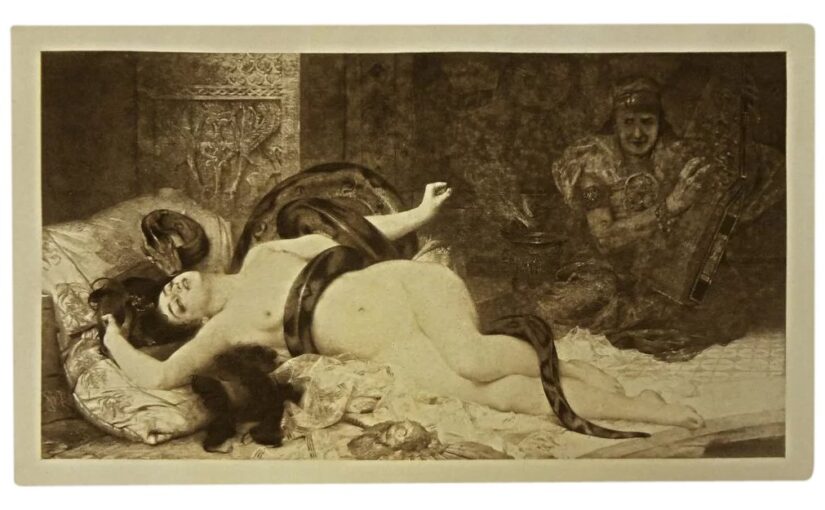 When I encountered this image during our class’s trout gallery visit, it quite literally stopped me in my tracks. Salammbô is visually stunning in its composition as well as narratively intriguing. It instantly sparked several questions about the circumstances of the print as well as its cultural significance and origin. I was fascinated to learn that this beautiful work is inspired by a book of the same name by famous French novelist Gustav Flaubert. The book tells the story of Salammbo, the daughter of the chief magistrate of Carthage, and the subject of this print. In the novel, Salammbo communes with a python, a symbol of the powerful moon goddess Tanith to gain the courage to steal back a protective mystical veil from the attacking mercenaries. In doing so, she saves the people of Carthage from a violent siege.
When I encountered this image during our class’s trout gallery visit, it quite literally stopped me in my tracks. Salammbô is visually stunning in its composition as well as narratively intriguing. It instantly sparked several questions about the circumstances of the print as well as its cultural significance and origin. I was fascinated to learn that this beautiful work is inspired by a book of the same name by famous French novelist Gustav Flaubert. The book tells the story of Salammbo, the daughter of the chief magistrate of Carthage, and the subject of this print. In the novel, Salammbo communes with a python, a symbol of the powerful moon goddess Tanith to gain the courage to steal back a protective mystical veil from the attacking mercenaries. In doing so, she saves the people of Carthage from a violent siege.
When I first saw this image, I was shocked by the immediate physical danger that Salammbô seems to be in. The snake is portrayed as very large and almost menacing at first glance, with its jaws poised dangerously close to her face. However, upon closer inspection, I noticed the sensual way in which the python is constricting itself around her as if it is clinging to her curves. Additionally, Salammbô’s facial expression is one of ecstasy and pleasure, which is surprising given the circumstances. Her glance towards the viewer is almost inviting, which evokes ideas of exhibitionism. The shading of the man in the background also suggests that he is unseen by Salammbô, therefore assuming the role of an unsolicited voyeur. Themes such as these were very popular in French salon artwork at the time, and pieces like this were especially appreciated by Victorian male viewers.
For Victorians, sexuality was meant to be controlled and subjugated in everyday life whenever possible. Women were held to extremely high standards of modesty, and limited to procreative sex with their socially acceptable, lawfully wedded husbands. They were meant to uphold the image of “the Angel in the House”, pure and uncorrupted by the outside world, unable to lead lives of their own or do anything really without the permission of men. Stories like Salammbo directly contradict these social expectations in a fantastical way. The subject of this striking work of art is daring, powerful, and yes, sexual on her own terms! Unlike Biblical Eve, who was tricked by a snake into succumbing to temptation and causing the fall of man, Salammbô is entwining herself with this python because she believes it will save her people. Therefore, this piece stands in stark contrast to many of the widely held beliefs about women at the time. Salammbô’s sexuality in this print differs from both typical associations with the femme fatale (she is supposedly using it to do moral good) and the prudish and restrictive connotations associated with the real-world Victorian body. Based on these elements, it makes sense that the Victorians would be both fascinated and intimidated by this work, as it represents both an interesting foreign culture and “indecent” ideas about female sexuality.
Sources:
Williams, Kate. “The Victorians were no prudes, but women had to play by men’s rules”. The Gaurdian, 23 May 2019, https://www.theguardian.com/commentisfree/2019/may/23/queen-victoria-sex-nudes-paintings-prudes-women. Accessed 9 April 2025.
The Editors of Encyclopaedia Britannica. “Salammbô”. Encyclopedia Britannica, 30 Apr. 2015, https://www.britannica.com/topic/Salammbo. Accessed 9 April 2025.
